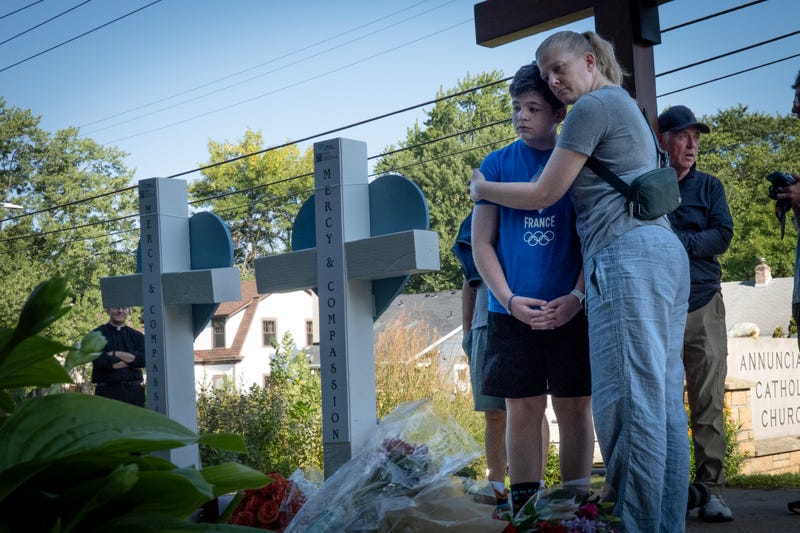Families in the Twin Cities, across Minnesota, and even across the country, are having hard conversations after the shooting at Annunciation Catholic School and Church in Minneapolis that killed two children and injured 17 others.
“As a father myself with kids at the age of these children who lost their lives, I can’t even imagine the pain these families are going through,” said Brandon Jones, M.A., CPPM consultant and executive director of the Minnesota Association for Children’s Mental Health (MACMH). “I also can’t imagine the pain of the kids who witnessed this. These are going to be memories for the rest of their lives. I don’t think we understand the full impact of things like this.”
When considering the impact of trauma, Jones cited the example of the 35W Bridge collapse in 2007 and the school bus that was on the bridge. Recently, Jones had a client who was on that bus.
“To hear their level of anxiety at getting on the highway, driving, bridges, or just being in vehicles, it was pretty significant.”
Jones says the impact of the shooting at Annunciation Church is wide. Parents and community members are asking Jones how to address this tragedy with their children. “Have age-appropriate conversations,” Jones explained. “Younger children need simple reassurance, while teens need space for more complex conversations. Every child deserves to be seen and heard in moments like this.”
Keeping routines in place is important, Jones said. He also encouraged parents to limit media exposure and instead spend time together. Reading and sticking to normal bedtime routines also helps ease fears.
Jones compiled age-appropriate scripts for parents and caregivers to start important conversations with their children as they try and process the news of the school shooting in Minneapolis while also preparing for back to school.
Under Age 5
Focus on feelings and reassurance.
Questions to ask: Did anything make you feel scared or worried today? Do you want a hug or some quiet time together? Can you show me on your face how you feel right now? Would you like to play or draw about how you feel?
Responses: You are safe here with me. It’s ok to feel scared. I’m here to help you. Would you like a hug or for me to sit with you?
Elementary School
Offer gentle reassurance and encourage expression through words, art, and play.
Questions to ask: How did you feel when you heard about the situation? Do you have any questions about what happened? What helps you feel safe when you’re worried? Would you like to draw, write, or talk about your feelings? Who are the people you trust at school or at home when you feel scared?
Responses: It’s normal to feel upset when something like this happens. You’re not alone. The adults at your school are working very hard to keep you safe. I know hearing about this is scary. You can always talk to me about how you feel. If you feel worried about school, you can tell a teacher or a trusted adult right away.

Middle School
Be more open-ended. Allow time for reflection and validate their awareness of what’s going on.
Questions to ask: How are you feeling when you hear the news, or when you’re talking about this with your friends? Is there anything that feels confusing or hard to understand? Do you feel nervous about being at school? What helps when you do? How can I best support you right now? Do I need to listen, do we spend time together, or do you want me to help you with something?
Responses: I can see that this news is upsetting. It’s ok to feel sad, angry, or confused. Even though bad things happen, there are many people working to keep schools safe. You don’t have to carry those feelings by yourself. I’m always here to listen. It’s ok to not have all the answers right now. We can figure this out together.
High School
Be respectful, validating, and encourage independence and coping strategies.
Questions to ask: What are your thoughts about what happened? How is this affecting you personally? Do you feel like you can talk about this with your friends, teachers, or me? What do you do when the news feels overwhelming? What gives you hope or helps you feel grounded when the world feels scary?
Responses: It’s ok if you feel angry, sad, or numb; everyone is responding differently. Even though tragedies happen, schools and communities are working hard to make safety a top priority. If you want space, that’s ok. If you want to talk, I’ll listen, no judgment. If it feels overwhelming, we can also connect you with other supports like counselors or therapists.
Jones said your tone should be calm, patient, and consistent. “For all ages, the goal isn’t to fix how they feel. It is to patiently validate their emotions and remind them that they’re not alone.”
